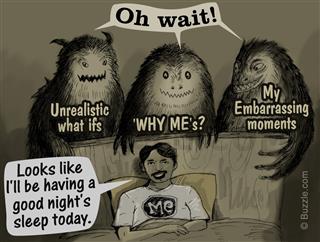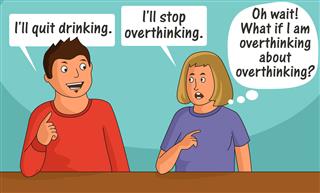
Over-thinkers, as the name suggests, tend to think, ponder, introspect, and worry excessively more than people would normally do. This PsycholoGenie post enlists 30 things that only over-thinkers can relate to.
Did You Know?
Research has shown that over-thinkers generally are aware of their flaws and also know how to fix them. This perfection, however, is likely to cause further harm in their relationships.
Quite often, you may have heard people state that over-thinking robs us of our happiness. From a psychological perspective, we all possess particular traits. There is a very thin line between sanity and insanity―after all, who is to decide who is sane and who is insane? Over-thinking is one of the unique traits certain people possess. These individuals think way too much; sometimes, beyond necessity. They are used to over-analyzing things for apparently no strong reason at all. You may have heard of the term ‘analysis paralysis’, an anti-pattern of over-analyzing things, people, and circumstances.
While many consider that every important decision does require a lot of thought, there are others who believe that we might be ruining our lives by over-thinking. If you are an over-thinker too, or if you deal with people who think more than required, you may relate to the pointers mentioned below.
You are constantly being nagged to make a choice.
Whether it is purchasing cereal from the supermarket, or a career decision, or repairing your car, you think from every possible angle. Will this product be safe? Are these shorts better? Does this service provider have a good reputation? Should I become a brain surgeon? Or an opera singer? And what not. You’ll probably have heard this statement too often from friends and family, ‘Make a choice! NOW!’.
You tend to blame yourself for everything.
Quite often, for reasons unknown, you blame yourself. You tend to get angry at yourself, believing that you are the sole reason something has happened. This can be a potential problem in relationships, when you assume that your partner has left you because something was probably wrong on your part, or that he/she is upset because you have done/said something. For the simplest of decisions, somewhere you are not even involved, you think that you were responsible for whatever has happened.
You have a lot of regrets.
This is one of the most obvious things that over-thinkers commonly experience. You think so much about everything, and yet, you tend to regret. Why did I do this? Why did I do that? Why did I not appreciate him? Why did I not go to the party? And on and on it goes. You regret for the simplest of decisions, some of which may not even have a significance in your life. It is very difficult for you to stop thinking about that phase and move on.
You are the most reliable person for everyone.
You are probably the best ‘go-to’ person in your group, the most reliable, and the most responsible. This is because your over-analysis prompts you to brood over myriad choices, and you have a plethora of advice and suggestions for others. It makes you feel good, and it makes people around you feel good.
You have a myriad options for every situation.
Nothing is a plain ‘Yes’ or ‘No’ for you. You believe that when thought about in depth, you will somehow unearth something that has not been tried before, which could be a possible solution for what you have been searching. Next, you tend to analyze why that option wasn’t considered earlier. Then, you start looking for further loopholes and other options. You think and think and have a myriad options ready. And you enjoy this process thoroughly.
When you apologize, you do so from the bottom of your heart.
This is one of the positive traits of an over-thinker. For that matter, they think carefully before saying or doing anything; however, in the event that they feel they have hurt someone, they will spend hours and hours going over every single detail of the fight, trying to figure out why they behaved in a particular way, why they said what they said, etc. And when they apologize, they do so from their heart, and mean every word of it―they cannot fake their apologies.

There are moments when you want others to make a choice for you.
No no, do not mistake them to be dependent on others for their choice. It’s just that, secretly, they are aware of how much confusion they may put their poor minds in, and how much trouble it may cause for others around them. Hence, in the event that others may be able to take a decision for them, they will gladly handover the reins and sit back.
A sound sleep is rare. You are constantly in a swirl of thoughts.
Sleep can be torturous for the poor over-thinkers. They are unable to sleep easily―their minds constantly drift back to different situations, and as the events of the day unfold, they think about how they happened, what could have been done, how, when, what, etc., etc. If they make a wrong choice that day, they will be unable to sleep peacefully. If it has been an ordinary day, they will start dwelling on incidents and decision that happened ages ago. Their minds are constantly churning out old and new thoughts, and this makes it difficult for them to sleep well.
It takes you forever to type out a message.
For some reason, over-thinkers take forever to type out a single message―whether it is on WhatsApp, Facebook, Twitter, or anywhere else. Spoiling relationships due to over-thinking is not unheard of. If they are in the early stages of a relationship, they will find it extremely difficult to type a single line. They will analyze and think about every word. For instance, they will type, ‘Hi! How are you?’ and then erase it immediately; perhaps they think the exclamation mark is unnecessary and indicates over-enthusiasm. Or they may type, ‘All good?’ and then erase the ‘good’ and type ‘fine’. Then, they might erase it again and type something else. And on and on it goes until they are in a tower of confusion.
You live in the moment during a party.
You are comfortable with your small group of friends, and until you are within these confines, you are the life and soul of the party. You love to sing, you love to dance, you love to drink. Except for the fact that you need a bit of warm-up time. You need to think and think and prepare your mind and body to make this party enjoyable. You think whether singing a particular song will make your friends happy, or dancing on a particular number is alright with everyone. Once that is done, the party is yours.
You do not take rash decisions.
While some are of the opinion that indecisiveness due to over-thinking is common, a great many vouch for the fact that thinking ahead helps avoid rash decisions. You know when to avoid a creepy boyfriend, or when to avoid a career change, or anything else that many people decide impulsively. Your over-thinking safeguards you from dangerous situations.

You are constantly being labeled as being insecure, nagging, or domineering.
The fact is, you are neither of these. You just think a lot. I mean, definitely a lot, which is why you get anxious and worried if your wife does not return home on time. You are possibly imagining that she may be in trouble, or may be she met someone else and forgot all about you, and what not. This makes you insecure, nagging, and even a control freak, if, under worry or tension, you order her to return home on time or question about her whereabouts.
You are aware that others find your behavior exasperating.
Yes, you are very well aware of it. Don’t you deny it or act innocent, you know you are rather annoying. But you still behave the same, for you are unable to change your basic trait. No complaints there, however.
Decision-making can be rather quick as well.
While many ponder over the simplest and most trivial of decisions, there are times when you make rather huge, crucial decisions in a matter of moments. This is a rather strange and character turn-around, but it exists, and is gratifying for you as well as the ones around you.
There is a constant conflict of thoughts in your mind.
You are never firm about one decision. You think of every possible scenario; your mind is filled with conflicting emotions and a roller coaster of thoughts, every time, everywhere. You are furious, happy, sad, satisfied, all at the same time, and you begin to wonder why you cannot feel one emotion at a time.
If you ever experience even the slightest of physical pain, you are clouded with anxiety.
This one can be bloody well infuriating, excuse my language. Everyone has physical ailments. But every minor pain or ache for you has to be a serious, never-ending affair. You will not rest until you find out another person who has been through a similar situation, question him about this condition, have him assure you, and then calm your frayed nerves. For God’s sake, everyone has some problem or the other, is it really necessary to imagine the worst possible scenario?

You require a lot of reasoning.
Why, why, why … is your motto. You need to know the reason behind every decision. You cannot accept impulsive decisions at all. Why did she break up with me? Why have I not scored as much? Why did it rain today? Why am I feeling strange? And on and on.
You like it when someone makes an effort to relieve your confusion.
Yes, it’s true. Since you are rather confused most of the time, you like it if someone tries to steer your thoughts to something else, offers to provide alternative solutions for your situation. You appreciate the fact that you do not have to introspect for once.
You love second opinions.
Don’t you just? As mentioned earlier, you are capable of generating an array of opinions about something. Which is why you love to hear second opinions. You send messages to your friends regarding the dress you will wear for the prom, or you submit your medical reports to 5 different specialists to get an opinion from every one of them, or you search 3 to 4 supermarkets to get opinions on a simple detergent. Then, you tend to analyze which option is the best and why.
You are an expert at interpreting people’s feelings.
You are a master at interpreting what people say and what they actually mean. Your instincts have made you sharper, and you can easily distinguish people based on their intentions, while others around you may be clueless about what’s happening.
You desperately want to know why you have been blocked on social networking sites.
You are obsessive about finding why you have been blocked or unfriended on Facebook or similar sites. You assume you are probably the only topic of discussion. In fact, you presume that even random chats amongst friends involve something you have said or done. You try and look for hints in the conversation and convince yourself that you have probably been a part of this discussion. Grow up, will you?
You proudly boast how over-thinking has saved you.
This is rather common. You have definitely been in situations where your instincts have saved you, and you take pride in boasting about the same, with a ‘See, I told you’ expression. Unfortunately, your friends do not get into praising you excessively.
You constantly keep thanking your friends.
Whatever for? You mull so much about unnecessary situations and grumble over trivial things, that you feel a constant need to keep thanking your friends. Well, technically, I don’t think that’s necessary.
You have not been sure of many things in life.
Right from choosing your school to your bag to deciding about ballet class or shopping or first dates and career paths, you have had a big question mark on your face. Not the ‘Oh I do not know what to do’ question mark, but the ‘What do I choose’ question mark. Confusion. Always.
You do not let go of things easily.
No, you don’t. The stubborn devil that you sometimes can be, you do not let go of things easily. You know that you can think and come up with a solution―whatever the problem. You want to think and come up with alternatives, to add a new dimension to the situation and have a different perspective. While this is quite commendable, it can be rather irritating if applied to simple situations.
You over-think about every single word you have been spoken to.
A single sentence or word or even an exclamation is enough to set your pulse racing. A simple ‘Hi’ from your boyfriend may lead you to search for hidden meanings, a simple gesture from your boss may lead you to think about different scenarios, and so on.

Your critical reasoning skills are beyond compare.
Oh yes, you are a master at critical analysis. You feel every single thing has to have a reason behind it. And, you are desperate to know what that reason is. You are an expert at understanding the underlying theory behind anything―be it verbal or written―and if there is no theory, you are expert enough to formulate one on your own.
You are extremely loyal to whoever you think makes you feel special.
Oh yes, you love the person who makes you feel alive. You come to know the person’s intentions and if you feel he can make you live in the moment without unnecessary judgment or introspection, you will be forever loyal to him.
You tend to complicate simple situations.
Of course you do. You cannot stand simplicity. You despise the easy way out, and begin to suspect that something is amiss. Therefore, you complicate every situation.
Mornings after the hangover, your worst nightmare.
As I said, you love to party after the initial hesitation. You drink like a fish. That’s not your area of concern. What you are petrified about the next morning, is what you may have said after you got drunk and what others thought about it. You would prefer death than facing that person again. Just relax, people. It’s alright. You don’t even know if you said anything.
So, over-thinkers, I hope you could relate with most of the stuff mentioned above. Do not worry about what you are labeled as or what people think about you. If your mind tends to over-think, do so. However, try not to complicate situations as well―this is for your own good so that your mental health is safe and sound. Once in a while, it is perfectly alright to let go. Just experience the feeling of not taxing your brain cells and feel free and liberated.






